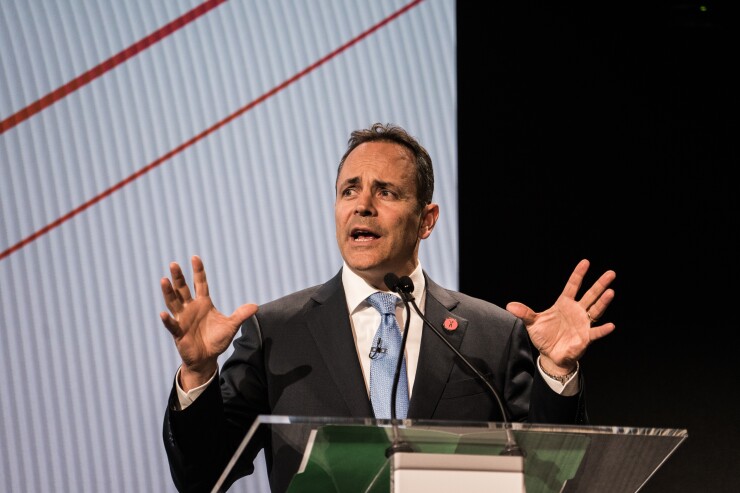Kentucky lawmakers left Frankfort unable to agree on pension reform measures, after meeting less than a day in emergency session.
House leaders, whose committees had only begun to review proposed legislation, said there wasn’t time to digest the two bills before them.

“This was not a problem that was created overnight,” House Speaker Pro-Tempore David Osborne, R-Prospect, said on the floor Tuesday night. Osborne said the problems with Kentucky’s severely underfunded pension systems can’t be solved in what was expected to be a week-long session.
Gov. Matt Bevin said he
In a proclamation for the session, Bevin said “impending credit downgrades based on the Supreme Court’s decision” would increase the state’s borrowing costs.
“The General Assembly has the sole authority to pass the laws needed to reform our failing pension system, and today they came up short of their responsibility as representatives of the people of Kentucky,” Bevin said after adjournment.
He added, “The result indicates that some of our legislators do not understand the gravity of the problem, or are here to put their political and personal interests ahead of what is best for our state’s financial health. Either way, this is bad for Kentucky.”
Osborne, the House Speaker-designate for 2019, said his caucus is well-aware of the gravity of the pension problem.
"The Majority will not run from making the tough decisions that have been ignored for years," he said
"We will take our time and analyze all points while working toward a solution during the upcoming 2019 Regular Session," he said. The session begins Jan. 8.
Rating agencies have already lowered the state’s ratings because of increased budget stress due to rising pension obligations.
In May, S&P Global Ratings lowered Kentucky’s issuer credit rating to A from A-plus and the state’s appropriation-backed obligations to A-minus from A. In July 2017, Moody’s Investors Service downgraded the state’s issuer rating to Aa3 from Aa2 and its appropriation bonds to A1 from Aa3.
Gurtin Municipal Bond Management said in a blog this month that pressures from Kentucky’s underfunded pensions and the state’s weak economy were among the reasons it no longer holds any of the state’s direct debt.
“Kentucky has stealthily slid its way toward the ignominious fate of potentially becoming the first U.S. state to exhaust a major public pension fund’s assets,” said the Gurtin Research Team.
The combined unfunded liability for the Kentucky Retirement System, the Teachers’ Retirement System, and the plan for judges and lawmakers totals $38 billion this year, a state legislative committee was told in November.
The weak funding levels mean that Kentucky could become the first state to go pay-as-you-go with its retiree benefit payments should its pension system assets continue to deteriorate, an event that could be precipitated by another significant market downturn, said Emily Robare, vice president of Gurtin’s credit research team.
“The downside of this is that the Commonwealth loses any flexibility it might have had to reduce pension costs during a recession and, as benefits continue to grow, could add more and more strain to the Commonwealth’s budget and crowd out other vital expenditures,” Robare said.
A state-level pension plan using pay-as-you-go to fund benefits would be unprecedented, she said, adding, “It is not clear how it might play out over time or how the bond market might respond, especially if revenues do not keep pace with pension and other expenditure growth.”
“The enormous challenges that the Commonwealth faces in turning around its pension plans, as well as the potential to have the first statewide pay-as-you-go pension plan, are what prompted us to put a ‘Do Not Buy’ rating on Commonwealth of Kentucky bonds in December 2017 and sell out of our remaining bonds in September of 2018,” said Robare.





